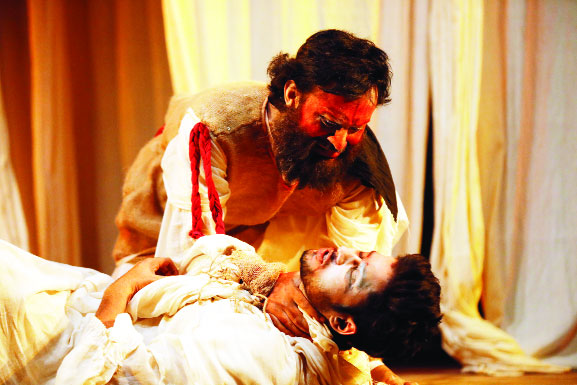Director K Madavane, who is known for directing many classic plays, is now presenting Shakespeare’s Macbeth. He shares his opinions on questions surrounding the play.
What is good and what is evil? Is dreaming of glory evil? Does human prophecy articulate fate or manifest inert desires? Does the end justify all your actions?
Raising such questions, director K Madavane’s recreation of Shakespeare’s Macbeth, brings back trivial realities of the current society and the tale of ruthlessness in the journey of human aspiration.
He recreates the tragic tale of Macbeth, who, blinded by his greed for power, mercilessly pursue his desires to eventually his own destruction.
To make a play set in a different era look authentic, there is a need to set up the perfect spotlights, costumes and objects that are not used today, which take up a lot of space on the stage. Just as Samuel Beckett’s Waiting for Godot gave us an empty stage with two beings and a tree in the dark background, what does he give to the stage for Macbeth, that is set in the 11th century Scotland? He explains the set up saying that this Macbeth does not quintessentially belong to a particular time, “Macbeth deals with tribal people from some country. The set is modern with moving curtains, appropriate costumes and so on. He belongs to every country, to every era, and to every human being. Our Macbeth doesn’t deal with any particular characteristics.”
There is a reason why Madavane, who recently directed Shakespeare’s another legendary play Hamlet in 2017, chose Macbeth to be his next direction. He believes that while choosing a play, one doesn’t really know why they are choosing it. He said, “Macbeth is a classic play and since I was in the ‘Shakespeare mood’ after Hamlet, I wanted to test myself about what are the new things I could bring to a classic that everybody knows. If they are appear identical, is there a point doing a play then?”
A play that is bound to be performed on the stage often undergoes constant revision, as there is no ‘one more take,’ to recite the written play in words modified for the audience’s frolic. So what goes into transforming a written play into a stage performance? Madavane needs at least 900 pages to answer this. For him, none can put the answer to this question on the paper. “And if the answer exists, it will always be personal: for that answer, the questioner should attend all the sessions of the rehearsals from the play reading to the last run through the play, as the process is rigorous.”
The play has changed and evolved as it dates back to an era when people could hardly study or write and were bereft of any kind of literature or books, plays were enacted to show them what the book had said. Even though today people can comprehend things and words, those plays still make it to theatres. They indeed depicted reality and are relevant even today. But how has Macbeth still remained so contemporary and applicable which can be watched even now? For Madavane, any art form always evolves. However, “how that happens is difficult to answer.”
He says, “During the 70s, theatre took inspiration from the Parsi and Indo-English plays. People thought that Theatre Walla or Shakespearana/Shakespeare Walla (family of Jennifer Kapoor/Kendal) was not relevant to India post Independence. There was a need for new genre to evolve. In response, new authors were born like (Vijay)Tendulkar, (Girish) Karnad , (Badal) Sircar and Mohan Rakesh. They all drew inspiration from the rich Indian culture to write their own plays. They have known each other very well and were aware that they were doing a new genre. They translated each other’s plays into their own mother tongue.”
While Shakespearean sonnets and plays have inspired directors like Madavane, what are the other influences that go in the making of the play? He questions, “In today’s world of globalisation, where we don’t even have the liberty to decide the manner in which you wash your body or choose a soap without any external reference, how can there be no influence?”
He believes that he is a product of many influences like “my family, the books I read, my friends, writers like Shakespeare (all his plays), and all the classic authors (like Victor Hugo) from so many countries, the movies I have watched. A person who wants to create, always cultivates himself. Even my dog can influence me by showing his happiness.”
However, he believes that nowadays, we don’t have enough distance to judge ourselves as “it is difficult now to tell where we will be in theatre in the 21st century.”
Since Madavane has directed the play globally in Canada, France, Australia, Africa, Indian Ocean Islands, he never structured it to suit any particular audience.
A director, who has been around for decades, has felt the evolution. From people who never read books to know about plays to various art critics, the theatre game has really morphed over the time. Scholars have believed that art, or more precisely, great arts are in a way immortal. It cannot be categorised in any compartment. “Sometimes the different art forms do meet. But most of the time, they prosper in their own space. For so many years, without any financial support of any organisation, all these folk-art forms like Terroukouttou, Yakshagana, Kathakali and so on, have persisted.”
With the onset of the digital space that is increasingly taking over the young Indian minds and becoming their story-learning mediums, have art forms like theatre and stage performance started to perish? “No.” As per Madavane, “Some youngsters want to experiment these art forms as well. They even try it out digitally. However, theatre will not die. It will always remain the same till the end of the human civilisation.”
Writer: Chahak Mittal
Courtesy: The Pioneer








 OpinionExpress.In
OpinionExpress.In















Comments (0)